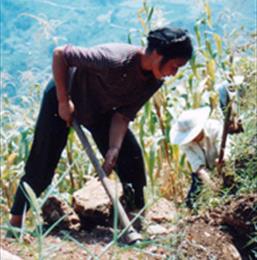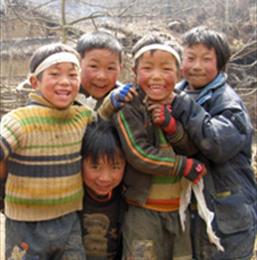Feb/Mar 2004
31st March 2004
Social Forestry Training Project
In newsletter no. 58 all DORS previous forestry projects were introduced. With support from MRDF, DORS has conducted a further evaluation in each of these 13 project locations.
In assessing whether these projects will be able to meet the long-term aims, the factors influencing the success or failure of the project were identified. During the evaluation research it was found that there is still a lack of sufficient technical skills amongst the population which was having a significant impact on the healthy development of forestry. Therefore to improve villagers' skills, it was decided to design and hold training sessions to train some village people, so that forestry techniques could be improved throughout these relatively remote locations. In addition to these trained people becoming local forestry experts, they can also act as demonstration households for improved forestry practices.
The trainees were split into three groups according to their existing skill levels, each group was trained for three days in Hanyuan County Fulin Town. In total 38 trainees from 10 villages took part, including a number of female participants. Throughout the training participatory methods were used: content of training, timing of training, location of training, etc. The training content was set according to the results of the previous evaluation, villagers'interests and expectations and the advice of the trainer a local forester Mr Bai. The content included pruning, grafting, pollination, fertilising, and other aspects.
In the training, theory was combined with practical work, giving the trainees an opportunity to also try out the newly learned skills in a nearby nursery. In addition some materials were prepared especially for the level of villagers understanding and language ability, that used visual methods of pictures and diagrams. The result so this training, revealed during a continuous assessment process during the training, a test of basic questions compared before and after training, and on follow up evaluations in the village, showed that the benefits of the training were substantial.
After the training, these trainees returned to the villagers and themselves held training session for the other villagers. DORS monitoring visits showed that all the village level trainers held training sessions in their villages on return and that the villagers technical views had changed, and their technical skills had improved, and had started putting some of these new skills into practice.
Cash Crop Production
Last year in April and May DORS implemented a loan project in Huodi Village and Chalin Village Hamlet 5, in total loans of 54,000 RMB were made to 85 households, and so far the repayment rate has been 85%. This project is to provide no interest loans to villages specifically to buy the inputs of bean canes for growing butter beans so that they can increase production of beans for market sale and increase their household income. The price of butter beans is quite high this year, and all participating households were able to make a profit.
Livestock Project
This project is to help Nimei Township, Huodi Village to develop animal husbandry, and to improve the variety of goats being raised, and was done in cooperation with a local livestock development policy. The local livestock policy stated that if a household had 50 head of doe goats the livestock bureau would donate an improved breed of buck goat to that household providing the household already had a suitable goat pen prepared, and had already planted grass for feed. The Township, with funds from the Minority Dept, would then donate two breeding buck goats of the Boer goat variety, one to each household, due to arrive at the end of March.
As there were no households with that number of goats, DORS provided 6000 RMB to Huodi to help two households who already had 40 doe goats each to purchase the 22 head needed to achieve the right number. But in order for the project to benefit the entire village, DORS through discussions with the villagers, agreed that all of these 22 head of goat, buck goat, and any of their offspring would be the property of the village. Regulations were drawn up in the village on how to manage and distribute the offspring in a fair way to benefit both the two goat breeding households and all other households in the village. If the goats are used for breeding with other females then a fee of 5 RMB is collected by the household after each successful mating, which is lower than the market rate. This is a collective project, in which all 50 households and 180 people of Huodi Village are participating.
Education School year 2003-2004
In fall 2003, DORS supported 306 students, 167 girl-students and 139 boy-students, expending RMB 37,943 on education grants in 14 villages. In Spring 2004, 266 students were supported, 135 girl-students and 131 boy-students, expending RMB 33,321 on education grants in 12 villages. For this school year a total of RMB 71,264 was expended. Education fees remain high in these villages and the drop out rates for poorer families, minority families and girl-students continue. After conducting informal interviews with parents, teachers and students to better understand the school drop-outs situation, DORS found out that labour, student age and marriage were the principle reasons for students' leaving school. Many children, once they reached the age of 12-13, are needed to help with household chores or work in the fields. In other cases, elder children who are still in lower grades, are embarrassed to attend classes with students of 7-8 years old, therefore stopped school even when DORS supported their education. In some villages, girls (15-16 years old) dropped out after attending a few semesters to get engaged to be married in a year or two. This school year, DORS has continued to support students from poor families who cannot afford to pay for school fees.


